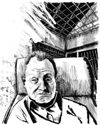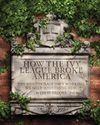The economist whose work dispelled the myth of social mobility in the U.S. Has a plan to make it a reality.

Raj Chetty before his life began. Got his biggest break his mother, Anbu, grew up in Tamil Nadu, a tropical state at the southern tip of the Indian subcontinent. Anbu showed the greatest academic potential of her five siblings, but her future was constrained by custom. Although Anbu’s father encouraged her scholarly inclinations, there were no colleges in the area, and sending his daughter away for an education would have been unseemly.
But as Anbu approached the end of high school, a minor miracle redirected her life. A local tycoon, himself the father of a bright daughter, decided to open a women’s college, housed in his elegant residence. Anbu was admitted to the inaugural class of 30 young women, learning English in the spacious courtyard under a thatched roof and traveling in the early mornings by bus to a nearby college to run chemistry experiments or dissect frogs’ hearts before the men arrived. Anbu excelled, and so began a rapid upward trajectory. She enrolled in medical school. “Why,” her father was asked, “do you send her there?” Among their Chettiar caste, husbands commonly worked abroad for years at a time, sending back money, while wives were left to raise the children. What use would a medical degree be to a stay-at-home mother?
In 1962, Anbu married Veerappa Chetty, a brilliant man from Tamil Nadu whose mother and grandmother had sometimes eaten less food so there would be more for him. Anbu became a doctor and supported her husband while he earned a doctorate in economics. By 1979, when Raj was born in New Delhi, his mother was a pediatrics professor and his father was an economics professor who had served as an adviser to Prime Minister Indira Gandhi.
Diese Geschichte stammt aus der August 2019-Ausgabe von The Atlantic.
Starten Sie Ihre 7-tägige kostenlose Testversion von Magzter GOLD, um auf Tausende kuratierte Premium-Storys sowie über 8.000 Zeitschriften und Zeitungen zuzugreifen.
Bereits Abonnent ? Anmelden
Diese Geschichte stammt aus der August 2019-Ausgabe von The Atlantic.
Starten Sie Ihre 7-tägige kostenlose Testversion von Magzter GOLD, um auf Tausende kuratierte Premium-Storys sowie über 8.000 Zeitschriften und Zeitungen zuzugreifen.
Bereits Abonnent? Anmelden

The Dark Origins of Impressionism
How the violence and deprivation of war inspired light-filled masterpieces

The Magic Mountain Saved My Life
When I was young and adrift, Thomas Manns novel gave me a sense of purpose. Today, its vision is startlingly relevant.

The Weirdest Hit in History
How Handel's Messiah became Western music's first classic

Culture Critics
Nick Cave Wants to Be Good \"I was just a nasty little guy.\"

ONE FOR THE ROAD
What I ate growing up with the Grateful Dead

Teaching Lucy
She was a superstar of American education. Then she was blamed for the country's literacy crisis. Can Lucy Calkins reclaim her good name?

A BOXER ON DEATH ROW
Iwao Hakamada spent an unprecedented five decades awaiting execution. Each day he woke up unsure whether it would be his last.

HOW THE IVY LEAGUE BROKE AMERICA
THE MERITOCRACY ISN'T WORKING. WE NEED SOMETHING NEW.

Against Type
How Jimmy O Yang became a main character

DISPATCHES
HOW TO BUILD A PALESTINIAN STATE There's still a way.